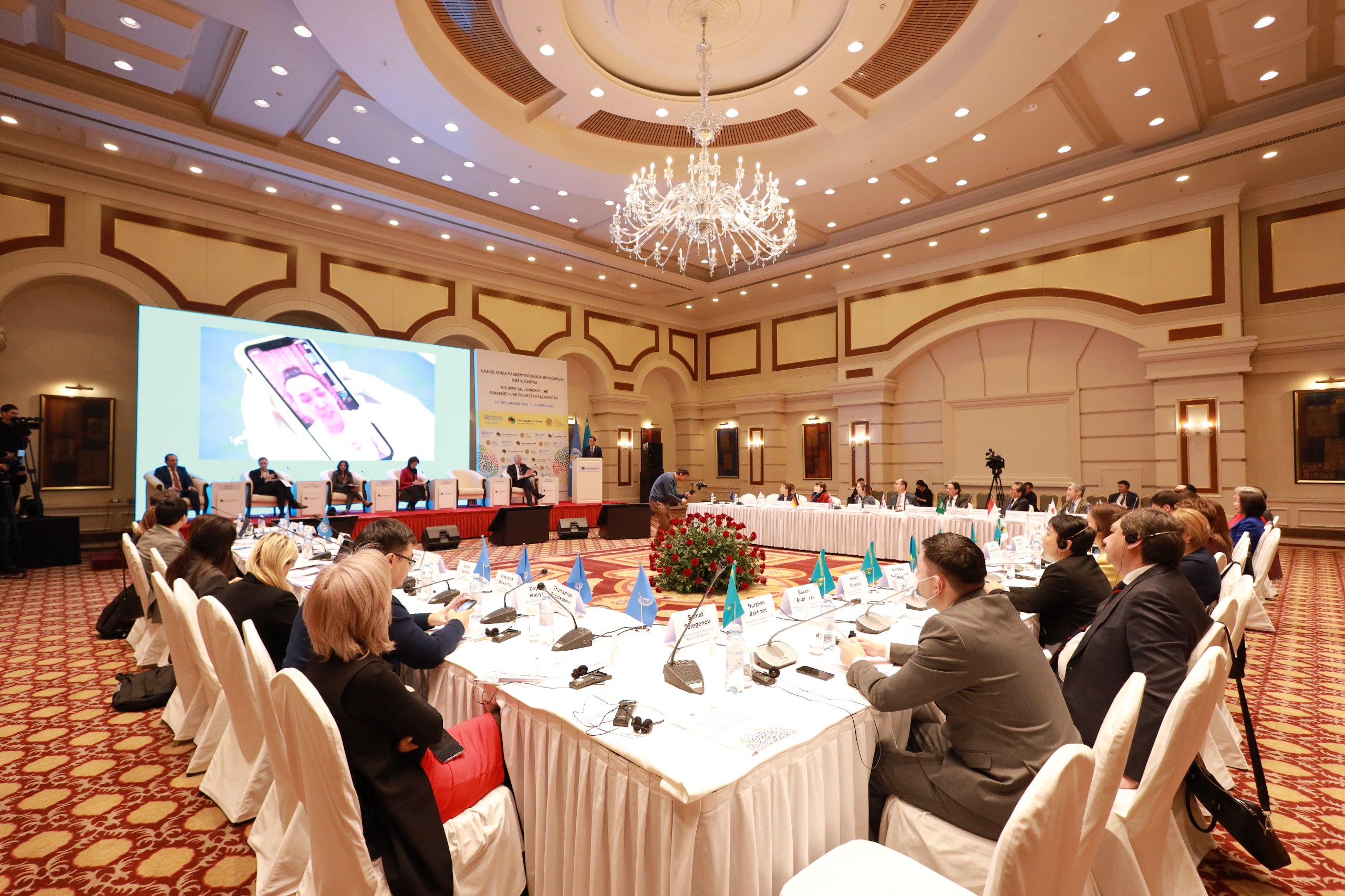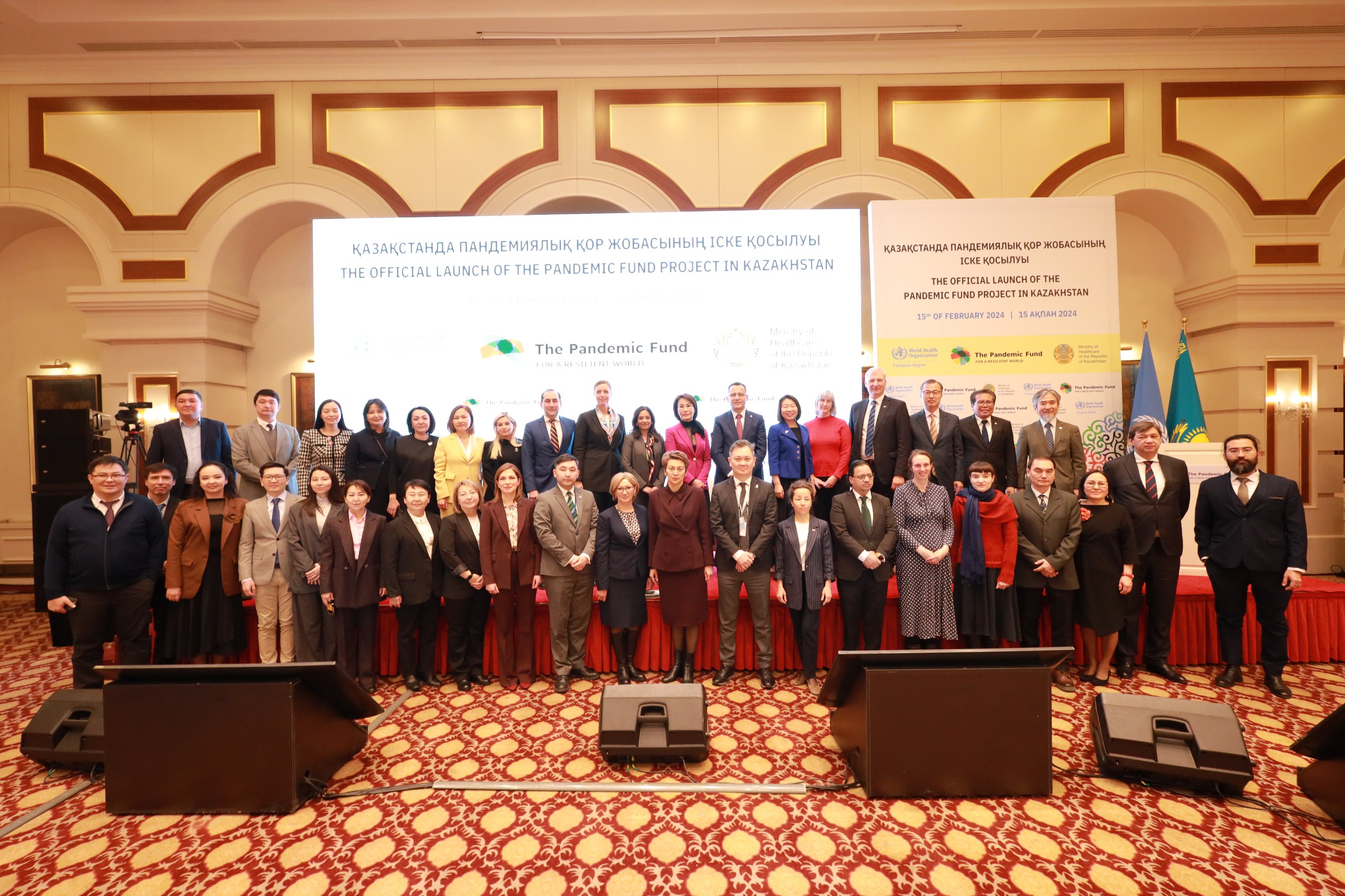ASTANA – The Ministry of Healthcare of Kazakhstan, the World Health Organization (WHO), with the support of the World Bank, launched the Pandemic Fund in Kazakhstan that aims to boost the country’s resilience to future pandemics on Feb. 15 in Astana.

The Pandemic Fund launched in Kazakhstan on Feb. 15 in Astana. Photo credit: Kazakhstan’s WHO press office.
Designed to build Kazakhstan’s capacity to prevent future infectious disease outbreaks, the fund allocated a $19 million grant alongside $3 million in co-financing, and $36 million in co-investments from the government of Kazakhstan.
“This project (…) embodies our shared commitment to safeguarding not just Kazakhstan, but the broader Central Asia region and beyond from the threats of future pandemics,” said the Executive Head of the Pandemic Fund Priya Basu, during the panel session.
Leveraging on the fund’s resources, the project aims to bolster Kazakhstan’s public health infrastructure, enhance epidemiological surveillance, border control measures, laboratory safety and the rapid detection and response mechanisms that are critical in the face of any health emergency.
“Central to the strategy of the pandemic fund is the use of our ground resources to motivate countries and regions to prioritize and enhance their pandemic prevention, preparedness and response efforts to comprehensive society-wide approaches,” said Basu.

Kazakh Ministry of Healthcare will partner with WHO and the World Bank to implement the initiatives enabled by the Pandemic Fund grant. Photo credit: Kazakhstan’s WHO press office.
“This project will serve as a model for pandemic preparedness, showcasing how strategic investments and collaborations can enhance national and regional security,” she added.
The global healthcare sector faces increasing risks of pandemics propelled by climate change.
“The significance of proactive preparation for future health emergencies cannot be overstated. Our experts predict that there is over 50% chance of another COVID-like pandemic emerging in the next 25 years, and climate change is exacerbating this risk,” said Basu.
Kazakhstan was selected among 179 applications from 129 countries within the framework of the first call for applications. The fund’s council selected 19 proposals, the recipients of which were 37 countries, including Kazakhstan.
Andrei Mikhnev, the World Bank’s country manager for Kazakhstan and Turkmenistan, said Kazakhstan previously has taken some encouraging steps in healthcare to receive a grant from the Pandemic Fund.
“The World Bank is really honored to be trusted by many donors to host the Pandemic Fund and it is really our pleasure also to acknowledge that Kazakhstan was amongst the first round of recipients of the funding from the Pandemic Fund. I’m really glad that Kazakhstan’s application was selected. That is a good recognition of the previous work done by Kazakhstan on this sector, and also a credit for the future to implement this activity with the ministry and WHO for the next three years,” said Mikhnev.
According to the Kazakh Minister of Healthcare, Akmaral Alnazarova, this move aligns with Kazakhstan’s need to elevate its health care sector.
“We need methodological support for proper forecasting and epidemiological surveillance activities for both infectious and non-infectious diseases because this is the basis for long-term planning of the health care system and for planning human resources policy in our health care system,” said Alnazarova.
“This project, I think, will allow us to systematize our work and to strengthen the overall capacity of the system. It will affect every medical organization as well as the industry as a whole. And most importantly, it should, in the long term, ensure that we are ready to meet any challenges of any nature that relate to the health of the population,” she added.
The funding provides an excellent opportunity for innovative solutions that can benefit patients not just in Kazakhstan but in a wider Central Asian region, according to the minister.
“I think the decision that you have taken with regard to Kazakhstan is justified by the fact that our country is located in the center of Central Asia. The Central Asian region is an endemic hotspot of highly dangerous infections and this is very relevant for us. The 70% of the territories in Kazakhstan are also endemic,” said Alnazarova.
The United Nations (UN) Resident Coordinator for Kazakhstan Michaela Friberg-Storey, said the launch of the fund is a significant stride towards establishing a partnership in regional and global health care platforms in line with the UN’s Sustainable Development Goals (SDG).
“I think what is important to note is that as we come together as the United Nations in Kazakhstan, this program will be possibly the largest one when it comes to budgetary terms. To me, this is an indication of how health and well-being are prioritized by the government, by us, as the UN system, and by the partners as well,” said Friberg-Storey.
She also highlighted that according to Kazakhstan’s Voluntary National Review in 2022, health and well-being were a top priority for Kazakh people.
Established in 2022 and formally launched at the G20 meetings in Indonesia last November, the Pandemic Fund is the first multilateral financing mechanism dedicated to providing multiyear grants to help low- and middle-income countries become better prepared for future pandemics. The fund is hosted by the World Bank.

